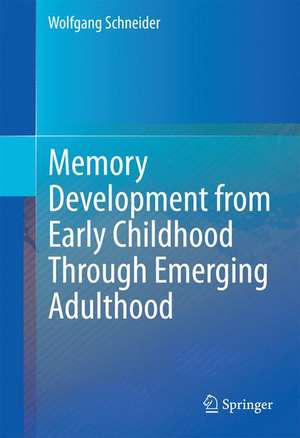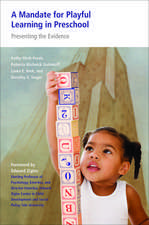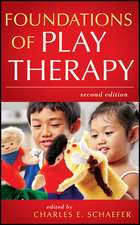Memory Development from Early Childhood Through Emerging Adulthood
Autor Wolfgang Schneideren Limba Engleză Hardback – 16 sep 2014
| Toate formatele și edițiile | Preț | Express |
|---|---|---|
| Paperback (1) | 645.79 lei 6-8 săpt. | |
| Springer International Publishing – 10 sep 2016 | 645.79 lei 6-8 săpt. | |
| Hardback (1) | 652.17 lei 6-8 săpt. | |
| Springer International Publishing – 16 sep 2014 | 652.17 lei 6-8 săpt. |
Preț: 652.17 lei
Preț vechi: 767.26 lei
-15% Nou
Puncte Express: 978
Preț estimativ în valută:
124.81€ • 129.82$ • 103.04£
124.81€ • 129.82$ • 103.04£
Carte tipărită la comandă
Livrare economică 14-28 aprilie
Preluare comenzi: 021 569.72.76
Specificații
ISBN-13: 9783319096100
ISBN-10: 3319096109
Pagini: 275
Ilustrații: XIII, 391 p. 44 illus.
Dimensiuni: 155 x 235 x 27 mm
Greutate: 0.74 kg
Ediția:2015
Editura: Springer International Publishing
Colecția Springer
Locul publicării:Cham, Switzerland
ISBN-10: 3319096109
Pagini: 275
Ilustrații: XIII, 391 p. 44 illus.
Dimensiuni: 155 x 235 x 27 mm
Greutate: 0.74 kg
Ediția:2015
Editura: Springer International Publishing
Colecția Springer
Locul publicării:Cham, Switzerland
Public țintă
ResearchCuprins
Chapter 1. Introduction.- Chapter 2. A brief history of memorydevelopment research.- Chapter 3. The development of implicitmemory.- Chapter 4. Memory development duringthe infant and toddler years.- Chapter 5. The development of event andautobiographical memory in childhood and adolescence.- Chapter 6. Basic memory capacities andmechanisms.- Chapter 7. The development of strategicmemory.- Chapter 8. Memory and knowledgedevelopment.- Chapter 9. The impact of culture andeducational context on memory development.- Chapter 10. Memory development frombehavioral, neuropsychological, and evolutionary perspectives: A comparison ofdifferent explanatory models.
Recenzii
“The book provides an important discussion on the interaction of implicit and explicit memory. … it is unquestionably an excellent resource for graduate students, researchers, and practitioners. … the book provides an excellent review of the development of memory while noting important debates and controversies within the field. … Anyone planning to teach a course in memory development will want to give this book very serious consideration.” (Stephen J. Ceci, Kayla A. Burd and Karen Ojeda, PsycCRITIQUES, Vol. 60 (33), August, 2015)
Notă biografică
Wolfgang Schneider is currently Professor of Psychology at the Department of Psychology, University of Würzburg, Germany. He received his Ph.D. in Psychology from the University of Heidelberg in 1979. His research interests include the development of memory and metacognition, giftedness and expertise, the development of reading and spelling as well as the prevention of reading and math difficulties. He was Vice President and President of the German Psychological Society (2000-2004) and also Vice President of the University of Würzburg (2004-2009). He is author and (co-) editor of about 40 books, including the volume co-authored with Michael Pressley on Memory Development between Two and Twenty and (co-) authored about 350 journal articles and book chapters. Professor Schneider is currently President of the International Society for the Study of Behavioral Development (ISSBD).
Textul de pe ultima copertă
Memory is intimately involved with higher cognitive functions such as decision making and problem solving. It is front and center even in the most basic workings of the human mind. These multiple connections make memory a more diversified entity than we once thought it to be. But how does this all evolve in the individual, and over how long a time?
Memory Development from Early Childhood Through Emerging Adulthood reviews current insights into ongoing and newer areas of developmental memory studies as well as innovations in testing, experimental design, and modeling. Chapters focus on pre-verbal and verbal memory, visuospatial memory, encoding and retrieval strategies, metamemory, and other core elements, locating their emergence from early infancy through emerging adulthood. The book's range of theories and findings carries considerable implications for study areas as varied as brain-behavior connections, children's learning styles, and the effects of early experiences on the developing psyche.
Key topics addressed include:
Adulthood is an essential resource for researchers, graduate students, and clinicians/scientist-practitioners in developmental and cognitive psychology as well as related mental and educational disciplines.
Memory Development from Early Childhood Through Emerging Adulthood reviews current insights into ongoing and newer areas of developmental memory studies as well as innovations in testing, experimental design, and modeling. Chapters focus on pre-verbal and verbal memory, visuospatial memory, encoding and retrieval strategies, metamemory, and other core elements, locating their emergence from early infancy through emerging adulthood. The book's range of theories and findings carries considerable implications for study areas as varied as brain-behavior connections, children's learning styles, and the effects of early experiences on the developing psyche.
Key topics addressed include:
- The development of implicit memory
- Memory development during the infant and toddler years
- The development of event and autobiographical memory in childhood and adolescence
- The role of basic memory capacity and working memory
- Effects of the knowledge base on memory development
- The development of metamemory
Adulthood is an essential resource for researchers, graduate students, and clinicians/scientist-practitioners in developmental and cognitive psychology as well as related mental and educational disciplines.
Caracteristici
Reviews fundamental capacities and mechanisms and explores advances in child and adolescent memory development Integrates memory development research from such related disciplines as behavioral, neuropsychological, and evolutionary sciences Examines infancy and brain-memory linkages as well as autobiographical and strategic memory Explores applied research in eyewitness memory, memory development in educational contexts Includes supplementary material: sn.pub/extras





